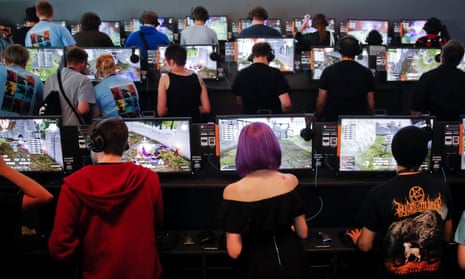At Christmas I was avoiding adult responsibility and leftovers by playing an online video game. Wandering in a post-apocalyptic wilderness, I happened upon a group of guys playing together. To my surprise, they didn’t kill me. They didn’t even steal my meagre possessions. Actually, I soon learned, they were a bunch of dads. Nice dads. They visited my base and instead of destroying it they started making it over: new walls, new lights, new stairs. It was like Queer Eye but for virtual wastelanders wearing golf outfits and wielding shotguns.
We played until 2am, chatting about parenthood and divorces and snacks. We’ve now swapped photos of our pets and connected on LinkedIn. We’ve come to know each other’s children by the shouting that bleeds through the chat party. It’s a delight.
Sign up to receive the top stories from Guardian Australia every morning
There’s plenty of fair criticism of video game communities – especially, at the risk of having my Twitter mentions trolled until the end of time, when you’re a woman. Chat is a source of sexual harassment, derision and (not infrequently) death threats. I mean, so is walking down the street and having a job, but a quick search of #gamergate shows how rife it is in gaming. There’s also a lot of heat on “addictive” games like Fortnite, alleging they encourage violence and teach antisocial behaviour. Yes, kids have racked up thousands of dollars on their parents’ phones. Yes, you can buy digital guns and put them in your digital holsters. Yes, my nephew sometimes flosses in public. But is online gaming inherently bad, or does it simply magnify what’s happening offline for worse or, if you’ll indulge me, for better?
When I shared my Nice Virtual Dads on Twitter, hundreds of people came forward with their own wholesome stories. I learned about a guy who’d been best man for a groom he’d met playing Counter-Strike. Someone else had gone into business with an old Second Life friend. I heard stories of surprise international visitors and generous gifts, lifelong friendships and organ donations. All these players had expected Lord of the Flies and instead found Blue Lagoon (sometimes including the weird sex stuff, let’s be honest).
With some exceptions, online games aren’t really designed for good vibes. In Stardew Valley, you fall in love by learning what kind of flowers someone likes. In Animal Crossing, you do favours in exchange for pretty decorations. In PUBG, you steal a car and use it to run people down. In Red Dead Online, you make a micro-transaction to buy a gun to headshot a guy and take his hat.
Modern collaborative gameplay centres around guilds, teams or battle-royale individualism with destruction as a common goal. Kill the enemy, loot the bodies. There’s enough realism in the art to make some of them truly violent. Players are rewarded in-game for antisocial behaviour, raiding and pillaging and “I fucked your mum!”ing one another like a kind of federal parliament simulator. And, yes, lots of players do it and they love it and now they’ve got powdered cheese all over themselves.
What’s interesting about games like Fallout 76, Sea of Thieves and others is that the developers have misunderstood how people want to interact with others in a virtual world. They’re designed for player vs player (PvP) gameplay, for people to meet up and go hell for leather on everything they’ve ever loved. And yet, here’s someone helping revive a new player. Here’s someone else guiding them through a quest they’ve done a dozen times. Here’s a group of nice dads building plastic flamingos for my online garden (blessedly not a euphemism).
Players do good in spite of the developers’ vision. They’ll actually work harder to be able to collaborate in a game that wants them to be enemies.
This isn’t because all gamers are secretly good. Oh my word, they are not. But as in the real world, there’s a groundswell of people who want to lift up others. Maybe they’re tired of how awful everything is. Maybe they’d rather create a positive community. Given the opportunity, they use what they’ve got to make someone feel nice.
I’m not talking about high-profile World of Warcraft weddings or eSports conferences. I mean those times players use what they have to improve someone else’s experience. They return the favour or pay it forward. Here, take this healing potion. Please, let me craft you something. Hey, I see you. We’re the same.
Stuff is hard right now. The real world seems more like a dystopian game title every day, all of us here frantically hunting for old save files. Is it possible we’re looking for a tonic, a reminder of the goodness of people? Maybe it’s an instinct, a biological need to form a functioning society. Maybe it’s just kindness. And if you’re lucky, maybe you’ll find it in the wasteland.
Anna Spargo-Ryan is the Melbourne based author of The Gulf and The Paper House, and winner of the 2016 Horne prize
